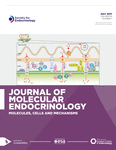Towards an understanding of cell-specific functions of signal-dependent transcription factors
- 1Department of Cellular and Molecular Medicine
2Biomedical Sciences Graduate Program
3Department of Medicine, University of California, San Diego, 9500 Gilman Drive, La Jolla, California 92093, USA
- Correspondence should be addressed to C K Glass; Email: ckg{at}ucsd.edu
Abstract
The ability to regulate gene expression in a cell-specific manner is a feature of many broadly expressed signal-dependent transcription factors (SDTFs), including nuclear hormone receptors and transcription factors that are activated by cell surface receptors for extracellular signals. As the most plastic cells of the hematopoietic system, macrophages are responsive to a wide spectrum of regulatory molecules and provide a robust model system for investigation of the basis for cell-specific transcriptional responses at a genome-wide level. Here, focusing on recent studies in macrophages, we review the evidence suggesting a model in which cell-specific actions of SDTFs are the consequence of priming functions of lineage determining transcription factors. We also discuss recent findings relating lineage-determining and SDTF activity to alterations in the epigenetic landscape as well as the production and function of enhancer RNAs. These findings have implications for the understanding of how natural genetic variation impacts cell-specific programs of gene expression and suggest new approaches for altering gene expression in vivo.
- cell-specific
- lineage determining transcription factors
- signal dependent transcription factors
- genome-wide analyses
- Revision received 11 October 2013
- Accepted 15 October 2013
- Made available online as an Accepted Preprint 15 October 2013
- © 2013 Society for Endocrinology











